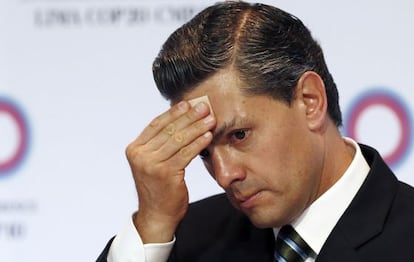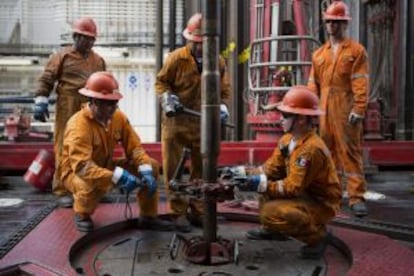A black day for Mexico’s economy
Peso devaluated, crude prices fell and stock exchange contracted on Wednesday


Besides their security concerns, Mexicans now have the economy to worry about as well.
On Wednesday, the Mexican stock exchange, Bolsa Mexicana de Valores, registered its biggest fall since 2009 after three straight days of losses.
Meanwhile, the price of Mexican crude was down 4.8 percent for an aggregated drop of 46 percent from its high for this year.
And to top it all off, the peso continues to lose ground to the dollar: the Mexican currency has depreciated six percent since mid-November, reaching 14.55 pesos to the dollar on Wednesday.
This comes close to the more than 15 pesos to the dollar reached in the spring of 2009, as a result of the financial crisis of the previous year.
The Mexican government has already decided to step in. This week, the Central Bank said it will intervene in the exchange market every time the peso depreciates 1.5 percent or more, injecting $200 million through auctions at a lower exchange rate for large financial transactions.
“The main goal is to bring liquidity to the market if it becomes necessary,” said the Exchange Commission, which is made up of representatives from the Treasury Ministry and the Bank of Mexico.
Analysts applauded the measure. “The Bank of Mexico’s decision did not manage to stop depreciation, but it did help the market because the fall could have been even greater,” notes Abraham Vergara, a professor at Iberoamericana University.
This tool had already been used before in 2011 and 2012. But it was suspended in April 2013 because the peso began to display some stability, hovering around 13 pesos to the dollar.

“We are well prepared to face the storm blowing in from the outside,” said Agustín Carstens, governor of the Bank of Mexico, on Wednesday. Carstens also predicted that the Mexican currency will appreciate in the near future, thanks to Mexico’s international reserves – $192 billion – and a flexible credit line of $70 billion that the International Monetary Fund has just renewed.
But it’s not just the external troubles that are affecting the economy.
“We’re in a period of uncertainty due to a lack of trust. Nobody really knows where the country is headed in the coming months in terms of security and application of the law. Investors are somewhat fearful,” says Vergara.
This opinion coincides with a December 5 analysis by the Bank of Mexico, which noted that economic activity had deteriorated over recent “social events” in connection with the missing trainee teachers from Iguala and the ensuing public protests.
While Carstens says that he will remain “vigilant” of external developments, the future holds a number of challenges. Investors predict that the Federal Reserve will raise interest rates in 2015 to prevent inflation. This could increase the volatility of the exchange market and affect the peso’s value to the dollar. If this were to happen, Mexico would turn to other tools.
“If depreciation starts to affect inflation, we will have to adjust interest rates,” said Carstens.
Plummeting oil and share prices
With a currency that is getting weaker, the global financial scenario is only adding to Mexico’s economic woes. The price of Mexican crude fell 4.8 percent to $54.4 a barrel, the lowest price since May 2009 according to the state-owned oil company PEMEX.
So far this year, Mexican oil has plummeted 46 percent from its top price of more than $90 a barrel. Treasury Secretary Luis Videgaray said that the falling prices will not affect next year’s finances, since 2015 oil revenues are already covered and Mexico will receive $79 per barrel.
Also on Wednesday, OPEC released its forecast for 2015 oil demand, which is expected to contract six percent in terms of sales volume. This piece of information dragged down the world’s stock exchanges including Mexico’s, where the Bolsa de Valores ended down 2.28 percent, the biggest drop since June 2013.
Despite the gloomy scenario, analysts are still open to a degree of optimism.
“These rough times will not be permanent, they will pass. The exchange rate will stabilize, together with stock exchange losses,” says Vergara.
Meanwhile, the slow but sure growth of the US economy will benefit Mexico, which depends on its northern neighbor because of their trade relations. And the Mexican government also hopes that by the second quarter of 2015 the country will start to feel the effect of investments made in connection with the energy and telecoms reforms and the infrastructure construction program.
Tu suscripción se está usando en otro dispositivo
¿Quieres añadir otro usuario a tu suscripción?
Si continúas leyendo en este dispositivo, no se podrá leer en el otro.
FlechaTu suscripción se está usando en otro dispositivo y solo puedes acceder a EL PAÍS desde un dispositivo a la vez.
Si quieres compartir tu cuenta, cambia tu suscripción a la modalidad Premium, así podrás añadir otro usuario. Cada uno accederá con su propia cuenta de email, lo que os permitirá personalizar vuestra experiencia en EL PAÍS.
¿Tienes una suscripción de empresa? Accede aquí para contratar más cuentas.
En el caso de no saber quién está usando tu cuenta, te recomendamos cambiar tu contraseña aquí.
Si decides continuar compartiendo tu cuenta, este mensaje se mostrará en tu dispositivo y en el de la otra persona que está usando tu cuenta de forma indefinida, afectando a tu experiencia de lectura. Puedes consultar aquí los términos y condiciones de la suscripción digital.








































